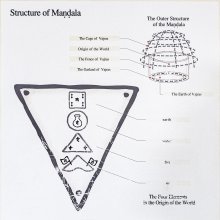Pancatattva, Pañcatattva, Pancan-tattva, Pamcatattva: 7 definitions
Introduction:
Pancatattva means something in Hinduism, Sanskrit. If you want to know the exact meaning, history, etymology or English translation of this term then check out the descriptions on this page. Add your comment or reference to a book if you want to contribute to this summary article.
Alternative spellings of this word include Panchatattva.
Images (photo gallery)
In Hinduism
Vaishnavism (Vaishava dharma)
Source: Pure Bhakti: Arcana-dipika - 3rd EditionPañcatattva (पञ्चतत्त्व) refers to:—The Supreme lord manifested in five features: (1) the original Supreme lord as the embodiment of a devotee, Śrī caitanya mahāprabhu, (2) the lord’s direct expansion as a devotee, Śrī nityānanda prabhu, (3) the Lord’s incarnation as a devotee, Śrī Advaita Prabhu, (4) the lord’s liberated associate manifest as a devotee, Śrīvāsa and (5) the lord’s internal potency manifest as a devotee, Śrī Gadādhara. peacock fan–a fan made of peacock feathers only used for Vrajendra-nandana Śrī kṛṣṇa. praṇāma–respectful obeisances. (cf. Glossary page from Arcana-dīpikā).

Vaishnava (वैष्णव, vaiṣṇava) or vaishnavism (vaiṣṇavism) represents a tradition of Hinduism worshipping Vishnu as the supreme Lord. Similar to the Shaktism and Shaivism traditions, Vaishnavism also developed as an individual movement, famous for its exposition of the dashavatara (‘ten avatars of Vishnu’).
Shaktism (Shakta philosophy)
Source: Google Books: ManthanabhairavatantramPañcatattva (पञ्चतत्त्व) refers to the “five (elemental) principles” [i.e., Earth, Water, Fire, Air, Space], according to the Ṭīkā (commentary) on the Manthānabhairavatantra, a vast sprawling work that belongs to a corpus of Tantric texts concerned with the worship of the goddess Kubjikā.—Accordingly, “[...] The extent of the pervasion of the thirty-six principles and their locations in the body are equivalent to those of the five elements and hence to the corresponding subjective identity. They accord with the nature of the place (sthāna) in which they are perceived and are related to one another as the support is to the supported. Thus, by attaining mastery over the five elements [i.e., pañcatattva] in this way, one attains mastery over all the thirty-six principles. [...] Thus, by knowing the five (elemental) principles [i.e., pañcatattva-parijñāna] completely by means of the five-fold Self, (all) thirty-six principles are attained. Similarly, by knowing the Śiva principle, that is, the principle of Supreme Śiva by means of the Śambhu's Self, which is the sixth, one becomes of his nature. Thus the pervasion of the sixfold Self has been explained”.

Shakta (शाक्त, śākta) or Shaktism (śāktism) represents a tradition of Hinduism where the Goddess (Devi) is revered and worshipped. Shakta literature includes a range of scriptures, including various Agamas and Tantras, although its roots may be traced back to the Vedas.
Languages of India and abroad
Sanskrit dictionary
Source: DDSA: The practical Sanskrit-English dictionaryPañcatattva (पञ्चतत्त्व).—
1) the five elements taken collectively; i. e. पृत्थी, अप्, तेजस्, वायु (pṛtthī, ap, tejas, vāyu) and आकाश (ākāśa).
2) (in the Tantras) the five essentials of the Tāntrikas, also called पञ्चमकार (pañcamakāra) because they all begin with म (ma); i. e. मद्य, मांस, मत्स्य, मुद्रा (madya, māṃsa, matsya, mudrā) and मैथुन (maithuna).
Derivable forms: pañcatattvam (पञ्चतत्त्वम्).
Pañcatattva is a Sanskrit compound consisting of the terms pañcan and tattva (तत्त्व).
Source: Cologne Digital Sanskrit Dictionaries: Monier-Williams Sanskrit-English Dictionary1) Pañcatattva (पञ्चतत्त्व):—[=pañca-tattva] [from pañca] n. the 5 elements collectively (cf. tattva), [cf. Lexicographers, esp. such as amarasiṃha, halāyudha, hemacandra, etc.]
2) [v.s. ...] (in the Tantras) the 5 essentials (= pañca-makāra q.v.)
[Sanskrit to German]
Sanskrit, also spelled संस्कृतम् (saṃskṛtam), is an ancient language of India commonly seen as the grandmother of the Indo-European language family (even English!). Closely allied with Prakrit and Pali, Sanskrit is more exhaustive in both grammar and terms and has the most extensive collection of literature in the world, greatly surpassing its sister-languages Greek and Latin.
Kannada-English dictionary
Source: Alar: Kannada-English corpusPaṃcatattva (ಪಂಚತತ್ತ್ವ):—[noun] = ಪಂಚಭೂತ [pamcabhuta].
Kannada is a Dravidian language (as opposed to the Indo-European language family) mainly spoken in the southwestern region of India.
See also (Relevant definitions)
Partial matches: Tattva, Panca.
Starts with: Pancatattvanirupana, Pancatattvaprakasha, Pancatattvatmakastotra.
Full-text: Pancamakara, Pancatattvaprakasha, Pancatattvatmakastotra, Pancama, Yonitantra, Parijnana, Paranandasutra, Brahma-muhurta, Pancatmaka, Makara.
Relevant text
Search found 10 books and stories containing Pancatattva, Pañcatattva, Pancan-tattva, Pañcan-tattva, Panca-tattva, Pañca-tattva, Pamcatattva, Paṃcatattva; (plurals include: Pancatattvas, Pañcatattvas, tattvas, Pamcatattvas, Paṃcatattvas). You can also click to the full overview containing English textual excerpts. Below are direct links for the most relevant articles:
Chaitanya Bhagavata (by Bhumipati Dāsa)
Verse 1.2.2 < [Chapter 2 - The Lord’s Appearance]
Verse 3.10.182 < [Chapter 10 - The Glories of Śrī Puṇḍarīka Vidyānidhi]
Verse 2.23.290 < [Chapter 23 - Wandering about Navadvīpa On the Day the Lord Delivered the Kazi]
Vedic influence on the Sun-worship in the Puranas (by Goswami Mitali)
Part 6 - Non-Vedic Religious System < [Chapter 3 - General Characteristics of the Purāṇic Religion and its Link with the Vedic Tradition]
Srila Gurudeva (The Supreme Treasure) (by Swami Bhaktivedanta Madhava Maharaja)
The Holy Name is the Best Process for Perfection < [Chapter 2.2 - Śrīman Mahāprabhu’s Greatest Donation]
Śrī Ramaṇa-māñjarī-aṣṭakam (visamavṛttena viracitam) < [Chapter 2.18 - Prayers to Śrīla Gurudeva]
Shakti and Shakta (by John Woodroffe)
Chapter VI - Śakti and Śākta < [Section 1 - Introductory]
Chapter VIII - Cīnācāra (Vasiṣṭha and Buddha) < [Section 1 - Introductory]
Chapter XXVII - Pañcatattva (the Secret Ritual) < [Section 3 - Ritual]
Expiatory Rites in Keralite Tantra (by T. S. Syamkumar)
2. Expiatory Rites in Tantrasamuccaya < [Chapter 3 - Expiatory Rites in Kerala Tantric Ritual Manuals]
Bhakti-rasamrta-sindhu (by Śrīla Rūpa Gosvāmī)
Related products

